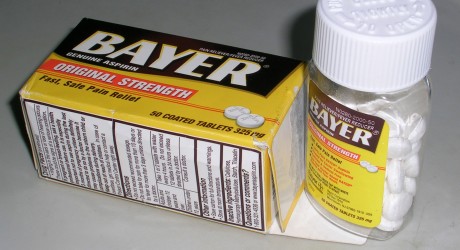By Caribbean Medical News Staff
A new study suggests that Aspirin may double the chances of survival for patients with gastrointestinal cancers. The outcome of the research was presented at the 2015 European Cancer Congress in Vienna, Austria.
Leading the research team was Dr. Martine Frouws of Leiden University Medical Centre. The teams’ objective was to determine how aspirin impacts the survival of patients with tumours in the gastrointestinal (GI) tract – specifically, the rectum, colon and oesophagus. According to the presenters, this is the only time a study has concurrently measured survival data by varied GI sites.
The research included 13,715 patients who were diagnosed with GI cancer between 1998- 2011. They were monitored for an average of 48.6 months. Of these patients, 42.8% had colon cancer, 25.4% had rectal cancer and 10.2% oesophageal cancer.
In order to determine how aspirin use after a GI cancer diagnosis obstructed the overall survival of these patients, the examiners linked patient data with drug dispensing information from the PHARMO Institute in Utrecht.
“In this study we analysed each separate prescription per patient, and therefore we were able to achieve a more exact estimate of the effect of aspirin on cancer survival,” said Dr. Frouws.
General, about 30.5% of patients used aspirin prior to GI cancer diagnosis, 8.3% only used aspirin after their diagnosis, while 61.1% did not use aspirin.
Across all cancers, around 28% of patients survived for at least 5 years.
A comparison was done with patients who used aspirin before their cancer diagnosis and those who did not use it. The results showed that patients who used aspirin after their diagnosis were twice as likely to survive.
Surprisingly, the discovery remained even after the team accounted for possible perplexing factors such as age, sex, cancer stage, cancer treatment and the presence of other medical conditions.
Though the exact mechanism underlying the anticancer effect of aspirin is ambiguous, the examiners propose it could be down to its antiplatelet properties. They said that circulating tumour cells (CTCs) are supposed to use platelets to protect themselves from the immune system. Since aspirin blocks the function of platelets, this may expose CTCs, leaving them unprotected.
Nonetheless, the ideal dosage and duration of aspirin use and its effect on GI cancers should in essence be investigated further. The researchers believe they have uncovered a prospective treatment alternative that could reach many patients.
“Given that aspirin is a cheap, off-patent drug with relatively few side effects, this will have a great impact on health care systems as well as patients,” explained Dr. Frouws.














